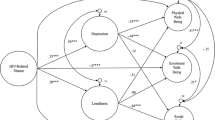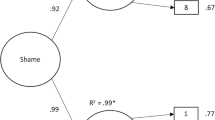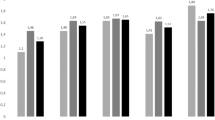Abstract
This study aimed to examine the role of decentering and committed action as mediators of the link of external and internal shame with psychological health, in people with a chronic disease diagnosis (n = 223) and without chronic disease (n = 230). Participants with chronic disease presented higher levels of both external and internal shame. Path analysis results showed that these variables seem to be negatively linked to psychological health and that their effects on this outcome seem to be reduced by the mechanisms of decentering and committed action. The tested model explained 56% of psychological health’s variance and was invariant across groups. This study emphasizes the importance of taking a decentered stance towards internal experiences and behaving accordingly to one’s personal values on psychosocial functioning, independently of disease status. These results may have particular relevance to individuals with high levels of shame.

Similar content being viewed by others
References
Alonso, J., Ferrer, M., Gandek, B., Ware, J. E., Aaronson, N. K., Mosconi, P., & Leplège, A. (2004). Health-related quality of life associated with chronic conditions in eight countries: Results from the International Quality of Life Assessment (IQOLA) Project. Quality of Life Research: An International Journal of Quality of Life Aspects of Treatment, Care and Rehabilitation, 13(2), 283–298. https://doi.org/10.1023/B:QURE.0000018472.46236.05
Arbuckle, J. L. (2013). Amos 2.20 User’s Guide. IBM SPSS.
Busse, R., Scheller-Kreinsen, D., & Zentner, A. (2010). Tackling chronic disease in Europe: strategies, interventions and challenges. Observatory Studies (No. 20). WHO Regional Office Europe.
Byrne, B. M. (2010). Structural Equation Modeling with AMOS. Routledge.
Canavarro, M. C., Simões, M. R., Vaz Serra, A., Pereira, M., Rijo, D., Quartilho, M., & Carona, C. (2007). WHOQOL-Bref Instrumento de Avaliação da Qualidade de Vida da Organização Mundial de Saúde [WHOQOLBref Quality of Life Assessment Instrument from the World Health Organization]. In M. R. Simões, M. M. Gonçalves & Almeida, L. S. (Coord.) Avaliação Psicológica: 46 Instrumentos válidos para a população portuguesa (Vol. III, pp. 77–100). Quarteto.
Casati, J., Toner, B. B., de Rooy, E. C., Drossman, D. A., & Maunder, R. G. (2000). Concerns of patients with inflammatory bowel disease: A review of emerging themes. Digestive Diseases and Sciences, 45, 26–31. https://doi.org/10.1023/A:105492806777
Clarke, D. M., & Currie, K. C. (2009). Depression, anxiety and their relationship with chronic diseases: A review of the epidemiology, risk and treatment evidence. The Medical Journal of Australia, 190(7), S54–S60. https://doi.org/10.5694/j.1326-5377.2009.tb02471.x
Cohen, J., Cohen, P., West, S., & Aiken, L. (2003). Applied multiple regression/correlation analysis for the behavioural sciences (3rd ed.). Lawrence Erlbaum Associates.
Coutinho, M., Trindade, I. A., & Ferreira, C. (2019). Experiential avoidance, committed action and quality of life: Differences between college students with and without chronic illness. Journal of Health Psychology. https://doi.org/10.1177/1359105319860167
Cresswell, J. D., Welch, W. T., Taylor, S. E., Sherman, D. K., Gruenewald, T. L., & Mann, T. (2005). Affirmation of personal values buffers neuroendocrine and psychological stress response. Psychological Science, 16, 846–851. https://doi.org/10.1111/j.1467-9280.2005.01624.x
Dearing, R. L., & Tangney, J. P. (Eds.). (2011). Shame in the therapy hour. APA Books.
Ferreira, C., Moura-Ramos, M., Matos, M., & Galhardo, A. (2020). A new measure to assess external and internal shame: Development, factor structure and psychometric properties of the External and Internal Shame Scale. Current Psychology. https://doi.org/10.1007/s12144-020-00709-0
Fresco, D. M., Moore, M. T., van Dulmen, M. H. M., Segal, Z. V., Ma, S. H., Teasdale, J. D., & Williams, J. M. G. (2007). Initial psychometric properties of the Experiences Questionnaire: Validation of a self-report measure of decentering. Behavior Therapy, 38, 234–246. https://doi.org/10.1016/j.beth.2006.08.003
Forestier, B., Anthoine, E., Reguiai, Z., Fohrer, C., & Blanchin, M. (2019). A systematic review of dimensions evaluating patient experience in chronic illness. Health and Quality of Life Outcomes, 17(19), 1–13. https://doi.org/10.1186/s12955-019-1084-2
Gilbert, P. (1998). What is shame? Some core issues and controversies. In P. Gilbert & B. Andrews (Eds.), Shame: Interpersonal behaviour, psychopathology and culture (pp. 3–36). Oxford University Press.
Gilbert, P. (2003). Evolution, social roles and the differences in shame and guilt. Social Research: An International Quarterly, 70(4), 1205–1230.
Gilbert, P. (2007). The evolution of shame as a marker for relationship security. In J. L. Tracy, R. W. Robins, & J. P. Tangney (Eds.), The self-conscious emotions: Theory and research (pp. 283–309). Guilford.
Gilbert, P. (2009). The compassionate mind: A new approach to the challenge of life. Constable & Robinson.
Gerteis, J., Izrael, D., Deitz, D., LeRoy, L., Ricciardi, R., Miller, T., & Basu, J. (2014). Multiple Chronic Conditions Chartbook. AHRQ Publications No, Q14-0038. Agency for Healthcare Research and Quality.
Graham, C. D., Rose, M. R., Grunfeld, E. A., Kyle, S. D., & Weinman, J. (2011). A systematic review of quality of life in adults with muscle disease. Journal of Neurology, 258(9), 1581–1592. https://doi.org/10.1007/s00415-011-6062-5
Gregório, S., Pinto-Gouveia, J., Duarte, C., & Simões, L. (2015). Expanding Research on Decentering as Measured by the Portuguese Version of the Experiences Questionnaire. Spanish Journal of Psychology, 18, 1–14. https://doi.org/10.1017/sjp.2015.18
Hayes, S. C., Luoma, J. B., Bond, F. W., Masuda, A., & Lillis, J. (2006). Acceptance and commitment therapy: Model, processes and outcomes. Behaviour Research and Therapy, 44, 1–25. https://doi.org/10.1016/j.brat.2005.06.006
Hayes, S. C., Strosahl, K. D., & Wilson, K. G. (1999). Acceptance and commitment therapy: An experiential approach to behavior change. Guilford Press.
Hu, L., & Bentler, P. M. (1999). Cutoff criteria for fit indexes in covariance structure analysis: Conventional criteria versus new alternatives. Structural Equation Modeling: A Multidisciplinary Journal, 6(1), 1–55. https://doi.org/10.1080/10705519909540118
IBM Corp Released. (2011). IBM SPSS Statistics for Windows, Version 20.0. IBM Corp.
Kellett, S., & Gilbert, P. (2001). Acne: A biopsychosocial and evolutionary perspective with a focus on shame. British Journal of Health Psychology, 6, 1–24. https://doi.org/10.1348/135910701169025
Kim, S., Thibodeau, R., & Jorgensen, R. S. (2011). Shame, guilt, and depressive symptoms: A meta-analytic review. Psychological Bulletin, 137(1), 68–96. https://doi.org/10.1037/a0021466
Kline, R. B. (2005). Principle and practice of structural equation modeling. Guilford.
Lotfaliany, M., Bowe, S. J., Kowal, P., Orellana, L., Berck, M., & Mohebbi, M. (2018). Depression and chronic diseases: Co-occurrence and communality of risk factors. Journal of Affective Disorders. https://doi.org/10.1016/j.jad.2018.08.011
MacKinnon, D. P. (2008). Introduction to statistical mediation analysis. Erlbaum.
Matos, M., Pinto-Gouveia, J., & Duarte, C. (2013). Internalizing early memories of shame and lack of safeness and warmth: The mediating role of shame on depression. Behavioural and Cognitive Psychoterapy, 41, 479–493. https://doi.org/10.1017/S1352465812001099
McCracken, L. M. (2013). Committed action: An application of the psychological flexibility model to activity patterns in chronic pain. The Journal of Pain, 14(8), 828–835. https://doi.org/10.1016/j.pain.2013.02.009
McCracken, L. M., Chilcot, J., & Norton, S. (2015). Further development in the assessment of psychological flexibility: A shortened committed action questionnaire (CAQ-8). European Journal of Pain, 19, 677–685. https://doi.org/10.1002/ejp.589
Mendes, A. L., Ferreira, C., & Marta-Simões, J. (2016). Experiential avoidance versus decentering abilities: The role of different emotional processes on disordered eating. Eating and Weight Disorders - Studies on Anorexia, Bulimia and Obesity, 22(3), 467–474. https://doi.org/10.1007/s40519-016-0291-7
Naragon-Gainey, K., & DeMarree, K. G. (2017). Decentering attenuates the association of negative affect and positive affect with psychopathology. Clinical Psychological Sciece. https://doi.org/10.1177/2167702617719758
Persons, E., Kershaw, T., Sikkema, K. J., & Hansen, N. B. (2010). The impact of shame on health-related quality of life among HIV-positive adults with a history of childhood sexual abuse. AIDS Patient Care and STDs, 24(9), 571–580. https://doi.org/10.1089/apc.2009.0209
Pinto-Gouveia, J., Duarte, C., Matos, M., & Fráguas, S. (2013). The protective role of self-compassion in relation to psychopathology symptoms and quality of life in chronic and in cancer patients. Clinical Psychology and Psychotherapy. https://doi.org/10.1002/cpp.1838
Sauer, S., & Baer, R. A. (2010). Mindfulness and decentering as mechanisms of change in mindfulness-and-acceptance-based interventions. In R. A. Baer (Ed.), Assessing mindfulness and acceptance processes in clientes: Illuminating the theory and practice of change (pp. 25–42). New Harbinger Publications Inc.
Segal, Z. V., Williams, J. M. G., & Teasdale, J. D. (2002). Mindfulness based cognitive therapy for depression: A new approach to preventing relapse. Guilford Press.
Singh, S., Wetterneck, C. T., Williams, M. T., & Knott, L. E. (2016). The role of shame and symptom severity on quality of life in obsessive-compulsive and related disorders. Journal of Obsessive-Compulsive and Related Disorders, 11, 49–55. https://doi.org/10.1016/j.jocrd.2016.08.004
Smith, S., & O’Dowd, T. (2007). Chronic diseases: What happens when they come in multiples? British Journal of General Practice, 57(537), 268–270.
Tangney, J. P., & Dearing, R. L. (2002). Shame and guilt. Guilford Press.
Trindade, I. A., Duarte, J., Ferreira, C., Coutinho, M., & Pinto-Gouveia, J. (2018). The impact of illness-related shame on psychological health and social relationships: Testing a mediational model in students with chronic illness. Clinical Psychology and Psychotherapy, 25(3), 408–414. https://doi.org/10.1002/cpp.2175
Trindade, I. A., Ferreira, C., & Pinto-Gouveia, J. (2015a). Ulcerative colitis symptomatology and depression: The exacerbator role of maladaptive psychological processes. Digestive Diseases and Sciences, 60(12), 3756–3763. https://doi.org/10.1007/s10620-015-3786-6
Trindade, I. A., Ferreira, C., Pinto-Gouveia, J., & Nooren, L. (2015b). Clarity of personal values and committed action: Development of a shorter Engaged Living Scale. Journal of Psychopathology and Behavior Assesment, 38(2), 258–265. https://doi.org/10.1007/s10862-015-9509-7
Trindade, I. A., Ferreira, C., & Pinto-Gouveia, J. (2017a). Chronic illness-related shame: Development of a new scale and novel approach for IBD patients’ depressive symptomatology. Clinical Psychology and Psychotherapy, 24(1), 255–263. https://doi.org/10.1002/cpp.2035
Trindade, I. A., Ferreira, C., & Pinto-Gouveia, J. (2017b). Shame and emotion regulation in inflammatory bowel disease: Effects on psychosocial functioning. Journal of Health Psychology. https://doi.org/10.1177/1359105317718925
Trindade, I. A., Marta-Simões, J., Ferreira, C., & Pinto-Gouveia, J. (2017c). Developments on committed action: Validity of the CAQ-8 and analysis of committed action’s role in depressive symptomatology in breast cancer patients and healthy individuals. Clinical Psychology and Psychotherapy, 25(1), e42–e50. https://doi.org/10.1002/cpp.2125
Trompetter, H. R., Ten Klooster, P. M., Schreurs, K. M., Fledderus, M., Westerhof, G. H., & Bohlmeijer, E. T. (2013). Measuring values and committed action with engaged living scale (ELS): Psychometric evaluation in a nonclinical sample and a chronic pain sample. Psychological Assessment, 4, 1235–1246. https://doi.org/10.1037/a0033813
WHO. (1998). Development of the World Health Organization WHOQOL-BREF quality of life assessment. The WHOQOL Group. Psychological Medicine, 28, 551–558. https://doi.org/10.1017/S0033291798006667
World Health Organization. (2018). Noncommunicable diseases. Retrieved from https://www.who.int/en/news-room/fact-sheets/detail/noncommunicable-diseases
Acknowledgements
We would like to thank the Association for the Support of Patients with Leukemia and Lymphoma, Portuguese Lung Foundation, National Association of Cystic Fibrosis, Portuguese Federation of People with Diabetes, Portuguese Association for Supporting Women with Endometriosis, Portuguese League Against Rheumatic Diseases, and Portuguese Association of Renal Insufficient for their help during the recruitment process of the sample of patients with physical chronic disease.
Funding
This research did not receive any specific grant from funding agencies in the public, commercial, or not-for-profit sectors.
Author information
Authors and Affiliations
Contributions
Authors CF and IAT designed the study, prepared the measures and wrote the protocol. Author IM-P recruited and assessed the participants. All the authors conducted literature research and provided summaries of previous research studies, conducted the statistical analysis and wrote the manuscript throughout its development stages. CF supervised and contributed throughout the conduction of these tasks and approved the final manuscript.
Corresponding author
Ethics declarations
Conflict of interest
Inês Matos-Pina, Inês A. Trindade, and Cláudia Ferreira declares that they have no conflict of interest.
Informed consent
All participants gave their informed consent before participating.
Ethical Approval
All procedures performed in studies involving human participants were in accordance with the ethical standards of the institutional research committee and with the 1964 Helsinki Declaration and its later amendments or comparable ethical standards. The present study was approved by the Ethical Board of the Faculty of Psychology and Education Sciences of the University of Coimbra.
Additional information
Publisher's Note
Springer Nature remains neutral with regard to jurisdictional claims in published maps and institutional affiliations.
Rights and permissions
About this article
Cite this article
Matos-Pina, I., Trindade, I.A. & Ferreira, C. Internal and External Shame in Healthy and Chronically Ill Samples: Exploring Links to Psychological Health. J Clin Psychol Med Settings 29, 412–420 (2022). https://doi.org/10.1007/s10880-022-09855-y
Accepted:
Published:
Issue Date:
DOI: https://doi.org/10.1007/s10880-022-09855-y




